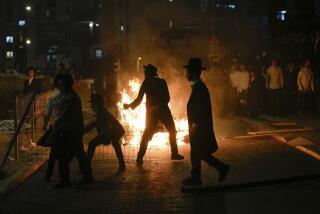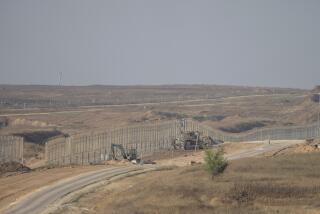59 Killed in Iraq as Insurgency Rages On
- Share via
BAGHDAD — A car bomb and a mass shooting killed 59 people in Iraq on Tuesday, many of them policemen and unemployed young men seeking to join the country’s beleaguered security forces. More than 120 Iraqis have been killed in the last three days as the nation’s insurgency shows no sign of abating.
The car bomb exploded just before 10 a.m. near a police command and recruitment center in Baghdad’s Rahmaniya neighborhood. The blast tore through a crowd of job applicants gathered at a nearby tea house, killing 47 people and wounding 114, according to the Iraqi Health Ministry.
In Baqubah, northeast of Baghdad, gunmen ambushed a minibus carrying recent police recruits, killing 12.
A statement on the Internet purportedly from Jordanian militant Abu Musab Zarqawi claimed responsibility for both attacks.
In other violence, the U.S. military announced that one soldier had been killed and five wounded near the northern city of Mosul when their patrol was hit by small-arms fire.
Tuesday’s attacks underscored the fragile position of Iraq’s security forces, which are struggling to recruit and train new members while coming under steady assault from insurgents who consider them collaborators with an illegitimate, U.S.-appointed interim government.
Police stations and recruitment centers have been frequent targets.
On Sept. 4, a car bomb at a police academy near the northern city of Kirkuk killed at least 20 people. On July 28, a car bomb killed 68 people outside a police recruiting center in Baqubah. An Iraqi army center near the fortified, U.S.-controlled Green Zone in central Baghdad was struck by car bombers in February and June, killing a total of more than 50.
“We’ve been expecting this for a long time,” said Haidar Abdel Hassan, 33, a former army officer who lives near the site of Tuesday’s blast.
Hassan said he would usually hang around one of the neighborhood tea shops, but had gone home for a cup because his usual haunt was closed after an early-morning mortar attack near the police station. As a result, most of the crowd had packed into a second tea shop almost directly in front of the booby-trapped car.
Khudeir Abbas Hamad, the owner of the tea shop, wasn’t present at the time of the blast. His father, who was minding the store, suffered head injuries. “He told me it had never been so crowded,” Hamad, 45, said.
The blast scattered charred metal and body parts across a commercial strip of restaurants, barbershops and billiard parlors. All were heavily damaged. Witnesses said the bomb was in a parked Toyota sedan, but no one could remember the driver.
Thirty feet from the deep crater left by the blast rested a twisted and blackened car chassis and an engine block with “Toyota” stamped on top. Around the scene lay the charred remnants of several pigeons blown from the trees.
Bloody clothing lay tangled in barbed wire, and at least 30 pairs of shoes and plastic sandals lay in a heap. A small cardboard box on the asphalt was half-filled with scraps of human flesh and hair, including an intact foot.
An old woman began collecting scraps of charred flesh. She then started to wail and beat her chest and head.
“We are hungry people, poor, what is the guilt of those innocent? Why are we punished in this way?” she cried.
Nearby lay a pile of applications and personal papers left by victims of the bombing who had gathered outside the Zawra Sporting Club across from the police station for physical examinations.
Applicants typically crowd around the gates of the club, which is bracketed by staggered concrete barriers designed to prevent car bombings. But on Tuesday, police forced the people to move away after several mortar rounds struck the club grounds before 8 a.m. The crowd moved around the corner to wait along the commercial strip where the bombing occurred.
“They told us to wait in the tea shop because it would be safer,” said Arkan Hussam Hassan, 20, recovering from burns to his face and hands in Baghdad’s Karch Hospital.
“We made them move away from the door for their own safety,” said a guard outside the police command center, who declined to give his name. “We advised them to go home, but they insisted on staying around.”
Interior Minister Falah Nakib visited the scene and blamed the attack on “groups who want to halt the reconstruction of Iraq.” Nakib pledged to continue government efforts to stamp out the insurgency. “No terrorist will stay in Iraq,” he said.
In Karch Hospital, a young man sat dazed on a bed, a bandage above his knee visible under his torn and bloody pants. Like most of the other victims, he had been hoping to secure a police job.
“I give up. I’ll look for some other kind of job,” he said.
In another bed, Taher Hussein, 35, sounded a note of defiance. “I’m still determined to join in order to protect Iraq,” he said.
Hussein’s sister Amal stood by his bedside, draped in a head-to-toe black abaya.
“The important thing is to protect our country from those who want to destroy it,” she said. “America isn’t doing anything. It’s up to the Iraqis to protect our home.... All the cards are jumbled together. It’s hard to even understand what’s happening.”
The blast struck near the northern entrance to Haifa Street, a longtime hotbed of support for insurgents. On Sunday, clashes between Iraqis and the U.S. military on the street left 13 people dead after a disabled Bradley fighting vehicle exploded among a crowd.
The area is populated by former members of Saddam Hussein’s army and intelligence services as well as Syrian and Palestinian immigrants who were given free housing and support by the former dictator. Sentiment for Zarqawi’s group Jamaat al Tawhid wal Jihad, or Unity and Jihad, runs high in the area, and U.S. and Iraqi patrols often come under attack there.
After Tuesday’s blast, angry crowds gathered and many people denounced the U.S. military and the Iraqi government for failing to protect Iraqi citizens. Some chanted slogans against President Bush and interim Iraqi Prime Minister Iyad Allawi. Rumors spread that the blast had been caused by a rocket from a U.S. warplane.
“The Americans want us to beg them to stay forever for the sake of security,” said Youssef Hassan, a 47-year-old tea shop employee. “No Muslim would do this. No Muslim would kill another Muslim.”
In claiming responsibility for the blast in the name of Unity and Jihad, the Internet statement said, “With the grace of God, a lion from our martyrdom brigades was successful in striking a center for apostate police volunteers.”
A second Internet statement reportedly claimed credit for the ambush of police recruits in Baqubah and hailed the “heroes” of Unity and Jihad for killing the police “agents.”
In that incident, gunmen in two cars overtook a red van carrying recruits who were leaving the Baqubah police station after receiving identification cards and completing paperwork to travel to Jordan for training.
Twelve people were killed and two injured, according to the Health Ministry.
Elsewhere in Iraq, clashes in Ramadi, west of Baghdad, killed 10 and wounded 22, according to the Health Ministry. Witnesses quoted by Reuters news agency said the fighting began when insurgents opened fire on U.S. tanks attempting to enter the city from the west. But the U.S. military said it had no reports of clashes in Ramadi.
Electricity was restored in Baghdad on Tuesday evening after a 14-hour blackout caused when saboteurs blew up a crucial oil pipeline junction near the northern town of Baiji early Tuesday. Power cables melted under the heat of the burning oil, causing a short that disabled power plants and cut off electricity across Iraq.
Special correspondents Raheem Salman in Baghdad and Faris Mahdawi in Baqubah contributed to this report.
More to Read
Sign up for Essential California
The most important California stories and recommendations in your inbox every morning.
You may occasionally receive promotional content from the Los Angeles Times.













